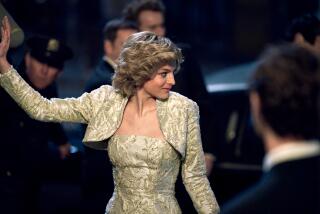BOOK REVIEW : Waugh’s Letters Hold Tender Clue : THE LETTERS OF EVELYN WAUGH AND DIANA COOPER; <i> edited by Artemis Cooper</i> ; Ticknor & Fields : $27.50; 344 pages
- Share via
“I have grown stouter and worse-tempered and more pompous,” Evelyn Waugh wrote to Lady Diana Cooper. He was not yet 50, but old fogey was a role he began to perform remarkably young, along, at various times, with others: perverted young thing, honking snob, defender of the old-time (Roman Catholic) religion.
Lady Diana, however, was one of the great loves of his life, and in the next sentence he took her backstage. “Women don’t understand pomposity,” he wrote. “It’s nearly always an absolutely private joke against the world.”
Give the word joke its full serious possibilities and you come close to the puzzle that Waugh presents. Under the blaring public nasty, the caricature Tory, the man who hurt and bewildered friends with his rudeness and outraged his fellow club members at Whites lived the most graceful English prose tragedian of the century, if to the classic pity and terror you add laughter.
This collection of “The Letters of Evelyn Waugh and Diana Cooper” yields a bit of everything: The man’s grace, his awfulness and just occasionally his tenderness. They were until recently a lost treasure. There is no space to recount the story of their retrieval, nicely told by Artemis Cooper, the editor and, as it considerably more than happens, Lady Diana’s granddaughter.
“The only human relationships I abide are intimacy, formality and servility. What is horrible here and in America is familiarity.” The perpetual bursts of shrapnel that attended Waugh’s life, and fill these letters, are his battle against the world’s familiarity. They furnish much of the subject of the letters and give them their wit and liveliness.
But the letters themselves are, in the main, the voice of intimacy. It was not just that Waugh would regularly head them “Darling Baby” and Diana, in return, “Beloved Bo.” It was that the posturing was of someone who knows he will be understood.
Occasionally, after a quarrel he would retreat into formality. This hurt her; after her husband Duff’s death, she refused to acknowledge Waugh’s first few notes of genuine condolence because, perhaps inhibited by regret, he headed them “Dearest Diana.” When he went back to “Baby,” she telephoned him at once.
The correspondence of the 1930s, when Waugh was playing explorer and war correspondent, shows the young poseur. He manages to dismiss Norway in a sentence: “The sun never sets, the bar never opens and the whole country smells of kippers.” It is less amusing when he writes from Fez: “Little Arab girls for 15-20 francs each. Bought one but didn’t enjoy her much.”
If these letters are brittle, those from the mid-1940s on have the rich texture of a complex emotional relationship. Although there is no indication that he and Lady Diana were ever lovers, there is certainly love, often plaintive, in many of his letters.
Lady Diana was a duke’s daughter and her husband, a high political figure; if there is such a thing as a beau monde, they were it. And Waugh loved the idea of such a world. It fitted his yearning for a lost Arcadia, though he couldn’t stand many Arcadians. Diana had fewer illusions. The sparring is wonderful.
Dazzled after a stay at the British Embassy in Paris, where Duff was ambassador, Waugh wrote of “the aesthetic joy of seeing you in your proper setting of luxury and splendor.” To which she replied ruefully: “Don’t love me only in my gilded cage.”
He was always after quiet moments and long talks; she liked action and company. He: “If only you could treat friends as something to be enjoyed in themselves not as companions in adventures, we should be so much happier together.” She: “I can live happily with you, but an isolate meal gives me fears, even with you. I’ve confidence in myself in adventurous, active and illicit conditions--backgrounds of forest glades, or dark Arab alleys--the darkened cinema--but I have very little in my conversational powers.”
Waugh, baroque, posturing and suddenly direct, wears his heart on his sleeve, even though he hides the sleeve under chain mail. Lady Diana is warm and perceptive. Her mind was first-rate, though more conventional than his; her real gift was the distinction of the emotions.
Her letters show need, and it says nothing against her to guess that in a postwar world where her values and splendors were fading, it meant a lot to have the devotion of this difficult man who loved them too. Being a genius, though, he clangorously transformed them, making golden clockwork nightingales out of her plain feathered ones.
Next: Christopher Goodrich reviews “A Fire in the Mind: The Life of Joseph Campbell” by Stephen Larsen and Robin Larsen (Doubleday).
More to Read
Sign up for our Book Club newsletter
Get the latest news, events and more from the Los Angeles Times Book Club, and help us get L.A. reading and talking.
You may occasionally receive promotional content from the Los Angeles Times.









